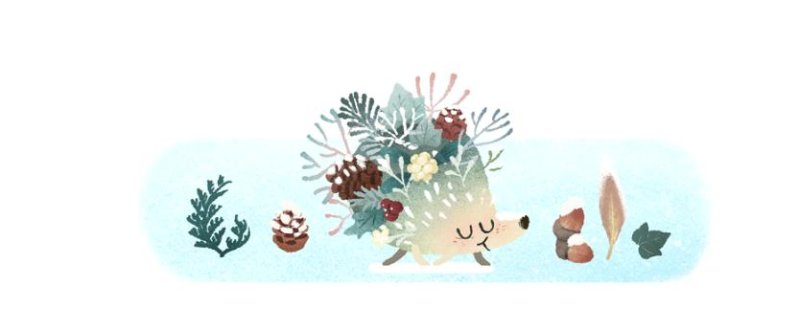Google celebrates the arrival of winter, summer with new Doodles

Google is marking the start of the winter solstice in the Northern Hemisphere with a new Doodle. Image courtesy of Google
Dec. 21 (UPI) -- Google welcomed the start of the winter solstice in the Northern Hemisphere and the start of the summer solstice in the Southern Hemisphere with new Doodles on Tuesday.
Google's homepage, for those living in the Northern Hemisphere, features an animated hedgehog walking through the snow with his eyes closed.
The hedgehog additionally has pine cones and leaves on his back.
For those in the Southern Hemisphere, the Doodle features the same hedgehog walking and smiling while wearing sunglasses. The animal has fruit and tropical plants on its back as the sun beams down on him.
Google presents Doodles every year to mark the arrival of the winter and summer solstice.
The company celebrated both the winter and summer solstice in 2020 along with the great conjunction, a rare occurrence between Jupiter and Saturn where the two planets nearly overlap.

Google is marking the start of the summer solstice in the Southern Hemisphere with a new Doodle. Image courtesy of Google

Google is marking the start of the winter solstice in the Northern Hemisphere with a new Doodle. Image courtesy of Google
Dec. 21 (UPI) -- Google welcomed the start of the winter solstice in the Northern Hemisphere and the start of the summer solstice in the Southern Hemisphere with new Doodles on Tuesday.
Google's homepage, for those living in the Northern Hemisphere, features an animated hedgehog walking through the snow with his eyes closed.
The hedgehog additionally has pine cones and leaves on his back.
For those in the Southern Hemisphere, the Doodle features the same hedgehog walking and smiling while wearing sunglasses. The animal has fruit and tropical plants on its back as the sun beams down on him.
Google presents Doodles every year to mark the arrival of the winter and summer solstice.
The company celebrated both the winter and summer solstice in 2020 along with the great conjunction, a rare occurrence between Jupiter and Saturn where the two planets nearly overlap.

Google is marking the start of the summer solstice in the Southern Hemisphere with a new Doodle. Image courtesy of Google

The sun sets over the Manhattan skyline in New York City. Tuesday marked the beginning of the winter solstice, which brings the shortest amount of daylight than any other day of the year. Photo by John Angelillo/UPI | License Photo
Dec. 21 (UPI) -- The start of winter arrived right on schedule on Tuesday -- 10:58 a.m. EST -- as the Northern Hemisphere officially entered the year's coldest season.
The start of the season is marked by the winter solstice, which brings the shortest day and longest night of the calendar year. It is at this point that the Northern Hemisphere is tilted farthest from the sun.
The winter solstice occurs when the sun is directly over the Tropic of Capricorn.
After Tuesday, days will begin to get progressively longer until culminating with the summer solstice on June 21.
The March equinox on March 20 will mark the beginning of the astronomical spring season.
Seasons change on Earth because the planet is slightly tilted on its axis as it travels around the sun. During the first week in January, Earth is about 1.6 million miles closer to the sun.
Although the astronomical winter season began on Tuesday, meteorologists typically view Dec. 1 as the start of winter.
The date of the winter solstice varies between Dec. 20 and Dec. 23, but it most often falls on the 21st or 22nd.
No comments:
Post a Comment